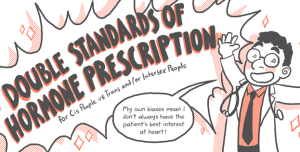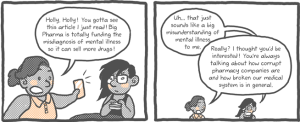Hey, y’all. This is another video in a series I’m doing with Everyday Feminism, which is a website dedicated to helping you stand up to and breakdown everyday oppression. In this video, I want to talk about gaslighting and how gaslighting relates to gender and feminism.
To start, a brief history of gaslighting:
The term itself comes from a movie called Gaslight. In the movie, a husband is deliberately attempting to make his spouse lose her mind by manipulating her, her friends, and her physical environment. He does this over a stretch of months. He’s not only upsetting her, but he’s confusing her and convincing her friends that she’s unstable. In turn, she becomes isolated from her friends and she starts doubting herself more and more.
This is where the term gaslighting comes from, but it’s come to mean something more nuanced. Now we use the term to refer to behavior that constitutes a form of mental abuse, in which the gaslighter tries, consciously or not — in the movie it’s very obvious and conscious but it isn’t always that way in real life. So the gaslighter tries to induce in someone the sense that their reactions, perceptions, memories, and beliefs are not only mistaken but utterly without grounds.
Gaslighting aims not just to dismiss someone’s views or reality, but actually convince the person themselves that their own reality is not to be trusted. In other words, gaslighting is used to confuse people into thinking that the reactions are so off-base or overreactive that they’re “crazy” and to be dismissed.
So an example to make it more grounded, so imagine a female student experiences sexual harassments from a man in her department, let’s say, a professor. She confronts him. She says, “That makes me uncomfortable.” He says, “Oh, you’re being a prude. Don’t be such a prude.” She goes to a fellow student and she says like, “Oh, what he did, it made me really uncomfortable but he just dismissed it.” The students says, “Oh, come on, it was just a joke. You’re overreacting. Like, don’t be so sensitive.”
In this example, the harasser, the professor, has a reason to deny her reality to protect himself by convincing her that she really is just being a prude, but the student who says she’s overreacting is likely just expressing some internalized notion of women as oversensitive and it’s unlikely that that student has the conscious aim to gaslight the female student but the result is cumulative.
So his comment just adds to an existing insecurity that was created by the original harasser. And that’s how gaslighting often works is it adds up over time, like in the movie, over a span of months and sometimes it can be from multiple voices.
So, how does gaslighting relate to gender? There’s nothing inherently or even necessarily sexist about gaslighting, but gaslighting interactions are often sexist in a variety of ways.
First, it’s important to note that women are more often the targets of gaslighting than men are and men are more likely to engage in gaslighting than women are.
Second, gaslighting often happens in response to a woman’s protests against sexism.
Third, when gaslighting is successful, it often reinforces the sexist norms that the target was trying to resist.
And fourth, this is the emotional manipulation that perpetuates the view that women are “crazy,” “irrational,” and “over-sensitive.”
This interaction, the kind in which women are labeled as “crazy,” “prudish,” “paranoid,” “over-sensitive,” is pervasive. It often comes from multiple voices over a long period of time, and it makes it really hard to quantify and grasp and it makes it much easier to believe. “Maybe I really am being over-sensitive. Am I really just a prude?” You start to question yourself.
Because gaslighting is often in response to protests by women against unjust behavior or beliefs, feminists, in particular, experience gaslighting as a tactic of silencing or dismissing what they’re saying.
So a feminist encounters some sexist norm like when a co-worker or a parent or teacher says something oppressive, and they speak up. They say, “Hey, that’s not okay” or “Hey, that’s sexist.” They’re very often met with gaslighting tactics like, “You’re just being paranoid. You’re over-sensitive. You’re crazy.”
In other words, a person who responds to a feminists objections like this is probably not genuinely concerned with their mental health, they’re probably trying to dismiss not only what you said in that precise context but your ability to make objections full stop. “You’re crazy; you’re paranoid; your objections are not be taken seriously.” That’s what’s being said.
As much as it’s easier to roll your eyes when a feminist calls it sexism than to give the weight and consideration it deserves, that’s what really needs to happen. But actually, gaslighting is even more than that. Gaslighters don’t just need the world to appear to themselves in a certain way. They need you, the target, to see it that way too.
So when it becomes clear that you don’t see it that way, when you present a challenge to the way that he is seeing something and he needs that challenge to disappear, so rather than have a discussion or debate with you over different beliefs, a gaslighter wants for you to not have the standing to even issue challenges to him. He wants you to not see yourself as having that standing either. He wants you to doubt your own standing.
Ultimately, the main aim of gaslighting is to destroy the possibility of disagreement. If you’re a feminist, especially an outspoken feminist, this will make some people very uncomfortable, I’m sure you’ve learned. They might even cause them to try to silence you and silence any source of possible disagreement.
The most direct way to do that is to radically undermine the potential source of disagreement so that you no longer have a place from which to stand from which you can disagree. So you’re labeled as crazy, paranoid, and sensitive so much that you start to doubt your own beliefs, that eventually you can lose your sense of yourself as capable of forming your own opinions and you become more soft-spoken and compliant, and the threat to his worldview is, therefore, neutralized.
In a society where one is constantly encountering instances of gaslighting, a person becomes less able to clearly express their feelings and experiences of what is bothering them. This holds sexist, racist, and other oppressive norms in place: by dismissing those whose reality is challenging their acceptance.
But what I want to say to you is don’t stop speaking up. Cry when you feel pain. When you speak about your pain and discomfort, it doesn’t make you overly sensitive. There are very valid reasons to cry. Yell when you’re angry. Men yell all the time and they’re not told that they’re overreacting. If you’ve been wronged, you have a right to express it without it being minimized.
Speak out against those who perpetuate a hostile environment. If it’s your professor or your boss being inappropriate to you, telling you that you’re a prude is not an appropriate response to being confronted up at their bad behavior.
And if someone is truly concerned about your perception of reality, if they truly think that you’re being paranoid or over sensitive, they’re not going to simply dismiss your comments as such. They’re going to try to help you figure out what’s going on and they’re going to validate your feelings while still attempting to help you heal and figure it out.
So passing comments that aim to dismiss what you experience as “crazy” or is not as big of a deal as you think it is, they’re not an attempt to help. They’re an attempt to convince you that you’re mistaken, so do not take their word for it.
I hope that this was helpful in grasping a very complicated and big topic, but one that’s really important to start talking about. I look forward to your comments. See you next time.




















